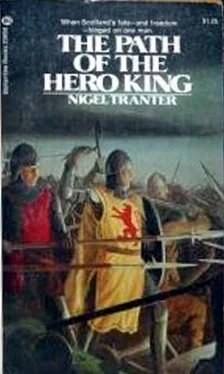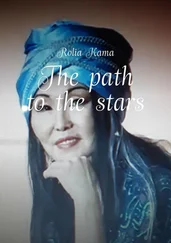Whether Gloucester, shaken and remounted on a riderless beast, realised this is not to be known. But he was only too glad to be able to lead his own people in detaching themselves from the disorderly embroilment. In groups and batches and handfuls the English disengaged and streamed back towards their main body.
The Bruces found themselves masters of the field, such as it was.
Edward would have pursued farther but the King was adamant.
Back, Edward, he cried.
Back to your own position on the hill. As do I. God is good-but if Hereford attacks now …
Quickly, or we may have won a bicker and lost a battle!
So the two Scots companies separated, and turned to ride back whence they had come, leaving the shambles behind. Sir Henry de Bohun was not alone, after all, on the trampled grass.
Avoiding the unused trenches, pits and caltrops, Bruce headed for the high ground. Hay, Campbell and Boyd, from the main rearward, came riding to meet the Kings party, in highly doubtful frame of mind, not knowing whether to cheer or weep, to praise or mil. The grizzled Boyd was most certain, and outspoken.
Sire, he accused, you hazarded all! It was ill done. If you had fallen there, in that fools ploy, Scotland would have gone down, Yon was a laddies victory-not a kings.
I know it, Robert my friend, Bruce admitted.
But my hand was something forced. You must bear with me. See-I have spoiled a good axe! Can anyone find me another?
Who was the Englishman, Sire? Hay asked.
In the first fray.
We saw it all, but could not tell the arms.
Henry Bohun, I think-nephew to Hereford. Would you have had me run from him, in single combat? Before two armies?
There was no answer to that, of course-save for the roaring cheer of the Scots massed ranks as their King rode up. That first blood of the battle may have been folly, bad generalship-but there was no doubt as to what it did for the Scots morale.
Those are Cliffords colours, the King declared.
I know them all too well! Where is he going?
He takes the Carse road, Gibbie said.
Hereford will have sent him forward, as scout, to see if they may win round by the north and east, to Stirling Bridge. By the flats …
That is no scouting party. There are 700 or 800 there. And they have left the Carse road. They are heading farther out, in the marshes. Picking their way. Medium cavalry again.
They must have a guide, Campbell suggested.
From Bannock, belike. Who knows the marshes.
A guide, yes. But more than that, I swear. One who knows more than the marshes. Our traps and de fences Someone from Stirling Castle, perhaps. Who has watched us cutting and digging the Carse causeways. From the castle they could see all that we did. Someone may have won out, and reached Hereford. And now leads Clifford northwards through the outer marshes, by divers ways.
The King was back, with his rearward leaders, on the vantage knoll where he had spent the first part of the day, the rest of the Scots host returned to their allotted positions. The great English van was still stationary, cautious, around the Milton of Bannock, holding the burn-crossing. Obviously Hereford was awaiting the arrival of the main invading army under King Edward and Pembroke, which must have been far behind. But meantime he had despatched this powerful cavalry force under Clifford, to probe a way north-abouts to Stirling Bridge, Angus Og, weary and yawning-for he had marched all yesterday, all night, and most of this day, after having had to fight a sea battle with John of Lorn and the English fleet at the mouth of Clyde-pointed.
These Carse marshes-who knows them well? Can the Englishwin round
to Stirling, by the shore? The tidelands? If so, we must retire, behind the Rock. By the west. Or be cut off.
Myself I know them well enough, Bruce answered.
Clifford can go another mile or so, twisting and turning. Then he will reach the Pelstream Burn, flowing into the Bannock. It is wide, with soft mud banks. Tidal there, a mile inland. They cannot cross that They must turn inland also. There is no ford or crossing place until they reach the road again. That bridge we have demolished. But there is a ford there. And they will have avoided all our traps.
We cannot halt them, then?
We must-God aiding! That is why Moray is posted at St. Ninians Kirk, with our van. He is just above that reach of the Cane. Can see it all from there. But … I never thought to see cavalry take the soft road through the marshes. Foot, perhaps-not horse. So Moray has only foot…
Then send these, your own cavalry, to aid him.
I dare not, Angus. Not yet. This may be but a ruse, to draw off our cavalry. That will never be the main battle, in those swamps and pows. So long as Hereford and Gloucester stand there, with the main van, I dare not detach my cavalry. Any of it. There are still 5,000 enemy cavalry waiting below us, in their van. My nephew must make do. with his foot. Pray he uses them well…
Sire! Hay exclaimed, gulping.
Look there! He comes-my lord of Moray! Himself. And he pointed
north eastwards
Christ God in Heaven! the King swore.
Has he taken leave of his wits, as well as his men? Cursing, he left them, spurring.
Sire-I have word for you, Randolph called, as they neared.
Ill word. We could be in trouble. I fear the English will know of the Carse traps …
Damnation, man! his uncle cried.
The more reason you be not here! What madness is this? I had to see you. We must change our plans. I could not send another. One of the Carse fowlers came to me. He saw three men slipping through the marshlands, southwards. After midday. Secretly.
One he swears was Sir Philip Moubray himself. From the castle. If it is he, he will know all. Our dispositions. Traps.
Bruce actually grabbed his nephews arm.
Quiet, man! And look! See you there!
Moray had cut across through the hillocks from St. Ninians, a mile away. For the first time, staring, he saw Cliffords force out on the low ground.
Merciful saints! he groaned.
Already! And Cavalry …!
Aye, cavalry. And you are here! Get back, man. Quickly!
But-here is what I came to say, Sire. This makes it more than ever vital. We must change plans. If we cannot bold the Cane road, you can be cut off. Your main host. We must retire on Stirling Bridge …
There is neither time nor the men to change our plans now, sir.
Retire from our strong position, in face of the enemy ready to move, and we are lost. Better that we be cut off, I say-since if lose we die here. But, by the Rude-we have not lost the Carse road yet! Get you back, my lord of Moray, to your post. A rose has fallen from your chaplet, today! But you may pick it up again, yet! You have time, still. Get you down, with your foot, into those marshes, and halt me Clifford. At all costs. He must not cross the Pelstream ford. A schiltrom, this side of it…
Without waiting for the rest, or another word, Moray went.
Bruce sent a runner to Douglas, on the left flank, to be ready to go to the assistance of Moray. But only if need be, and with only half his cavalry. Leave the Steward with the rest, in case the English main attack developed meantime.
Anxiously the King and his colleagues returned to the vantage point, to watch.
Presently they saw Cliffords cavalry reach the south bank of the Pelstream Burn near its junction with the Bannock, and then turn westwards, inland, following it. No cavalry-nor foot either-could cross that mud-lined, mud-bottomed, tidal stream.
If Moubray was leading them, he must have told them so.
The Pelstream meandered across the flats in serpentine coils, and Cliffords hundreds made slow work of following its sodden, sedge-lined banks. But even so, not slow enough for Robert Bruce, grudging them every step. He groaned at the thought of all their barriers and ditches avoided.
Читать дальше












